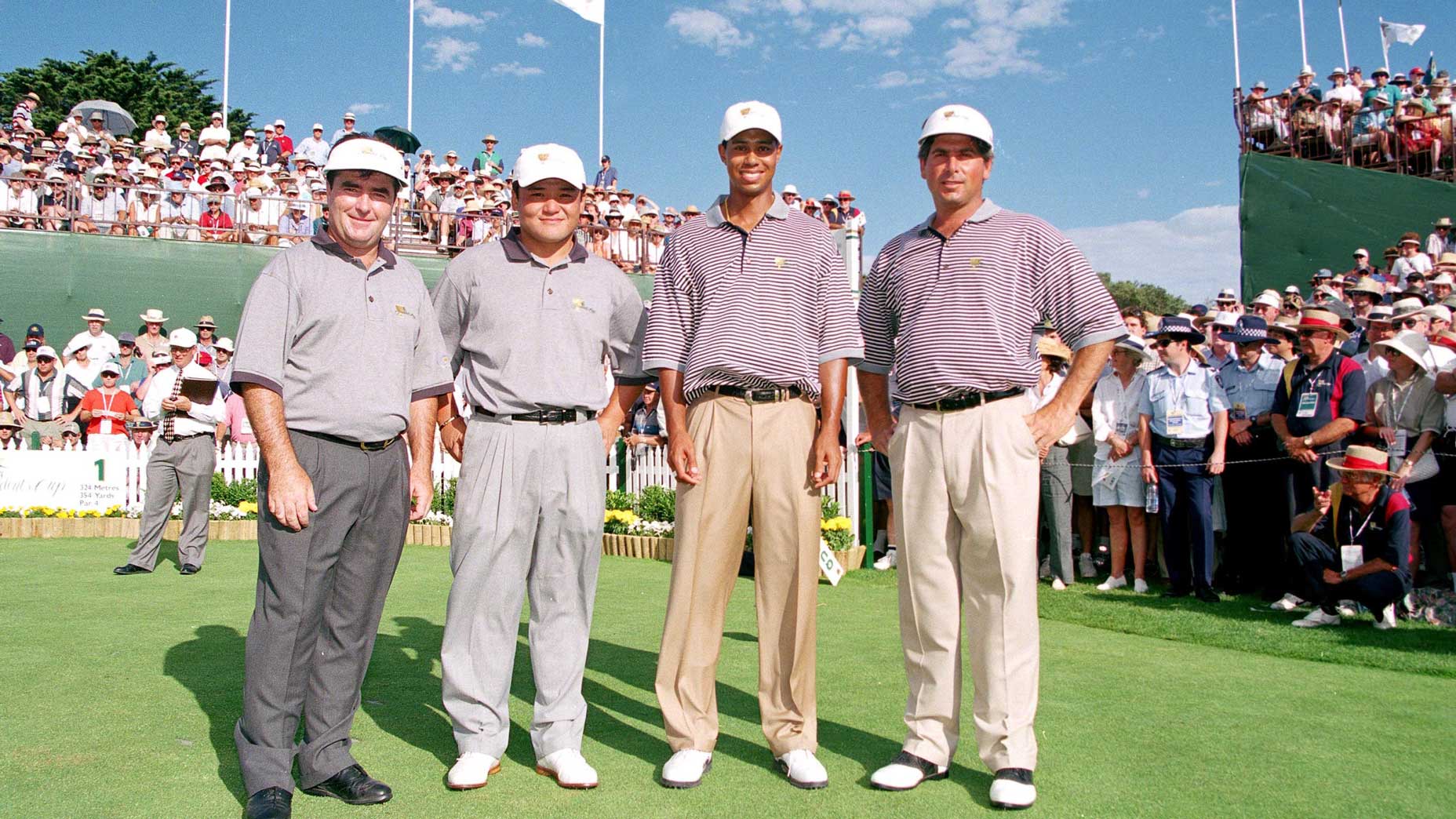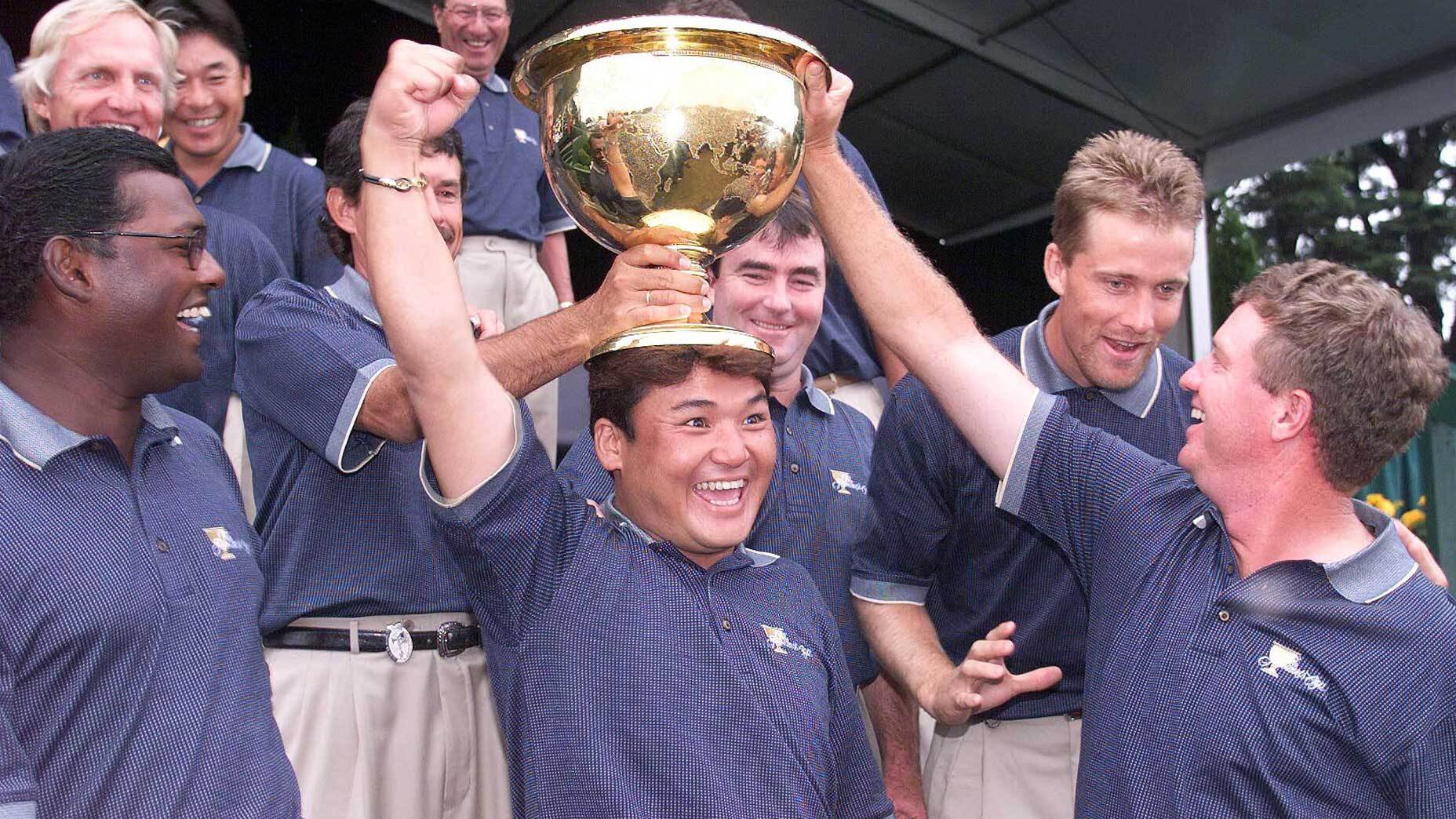He beat Ngwe. And Phil. Now he's back – as the Presidents Cup's secret weapon

Shigeki Maruyama is a key player behind the 2024 Presidents Cup.
Getty Images
MONTREAL — At the Presidents Cup, the international team is constantly reminded of one thing: They will never win this event.
Almost never, that is.
But it can actually be done. Need proof? It's in the locker room. He is there over there in the bathroom. A 5-foot-7, Presidents Cup-winning, Tiger-and-Phil-beating, undefeated legend. And he might be the International Team's secret weapon this time around.
First, a trip back. The year was 1998 and it was the third game of the Presidents Cup, now on its first trip outside the United States. Australia's Royal Melbourne played host, 22-year-old world number 1 Tiger Woods made his US debut and Jack Nicklaus captained the team. Another American list was stacked, too: World No. 2 Mark O'Meara, No. 3 David Duval, No. 4 Davis Love III, No. 10 Phil Mickelson, No. 11 Fred Couples – you get the idea.
But then a funny thing happened: The international team, captained by Peter Thomson, won the first three games and never looked back. They gave the American people a drunkenness, unprecedented and unmatched since. Their unlikely leader that week? Japan's Shigeki Maruyama, who entered this week as the top player on the Japan Tour but a relative unknown on the international stage; he was the rookie of the event and the World No. 43, lower than the lowest ranked American. No matter: He partnered two of the lowest-ranked golfers in the field and went undefeated, 5-0-0, defeating some of the game's biggest names en route to a perfect week.
Maruyama's outstanding run began that Friday morning (the competition was only three days old at the time) and four-man partner Craig Parry, Aussie and World No. 53. This duo took down Lee Janzen and Scott Hoch 3 and 2. That afternoon Maruyama played four-ball alongside countryman Joe Ozaki (World No. 55, brother of the more famous Jumbo Ozaki) and beat Mark Calcavecchia and John Huston 4 and 3. The Internationals opened up a 7-3 lead.
On Saturday, Maruyama and Parry took on a star-studded American team, Woods and Couples, who only succeeded in forcing Maruyama to bogey the 18th hole – but the international side still prevailed, 1 up, as part of a 4.5-0.5 rout in the set that all except putting the cup on the bed. That afternoon Maruyama and Ozaki took on another American premiership, Duval and Mickelson. They also came out with 1 victory on top, and Maruyama left playing with the win that gave him his nickname: “The Smiling Assassin.”

Getty Images
On Sunday, Maruyama finished his week by handling Huston in a 3-2 victory, capping off a game that is historic on many counts. Maruyama's 5-0-0 record was the first for an international player; only one player (Branden Grace in 2015) has since matched it. And 1998 is still the team's last international victory, most notable because it came out 20.5-11.5 by nine points.
“Since I was a rookie, and every American player was a star, I wasn't afraid of the games,” said Maruyama in a recent interview with. China Daily. He also remembered how Thomson had urged them to stay happy during the competition. “I used to smile a lot and shout 'wow!' to encourage the team,” added Maruyama.
“After the ceremony, I thought it would be funny to show off, and I remember putting the trophy on my head and shouting with joy.”
What follows is arguably the most iconic image of that win.

getty photos
But twenty and a half years of futility followed. The international team got a draw in 2003 but have lost nine in a row since then; A win for America at Royal Montreal this week would make it 10. Maruyama played only one cup; went 1-2-0 as part of a losing effort at Robert Trent Jones Golf Club in 2000. But his .750 winning percentage remains the highest of any major international player.
And now he's back.
RUYAMA KEPT SILENT at the end of the press conference of the assistant captains on Wednesday afternoon at Royal Montreal, the oldest of the nine men on the stage. Teammate Ernie Els, who went 3-1-1 as part of that 1998 team, recalled their celebration party, how it went from a black table to a plane and how lucky they were to be allowed to board at all. Furyk, who was on the losing side as a President's Cup player that week, is the American captain this week. Of the twenty-somethings covering this week's teams, that win may sound like ancient history, but it hasn't faded from the collective memory of the Presidents Cup. Just not yet.
Maruyama got angry when a reporter asked a question his way for the first time. Have you been able to share the news so far with the team? Any wisdom? Was he able to enjoy that 5-0-0 week? He shook his head, then delivered a long, thoughtful speech in Japanese to the assembled (mostly English-speaking) media. Assistant Camilo Villegas leans into his microphone as Maruyama finishes his remarks.
“Getting all that?” he added, drawing a laugh.
The translator relayed Maruyama's words. “I didn't get a good chance to talk to all these guys about what happened just because my English is not good, so it's difficult to talk,” he said. “I learned a lot in that week, and I learned that my game can translate to the world, around the world, not just in Japan. If some of these guys want to talk about it or anything, I'm always open, and we can talk about it more. I would like to help the team in any way I can.”
Maruyama's role is as unique as this point in his life; he has been away from acting for a long time. He won three times on the PGA Tour – in 2001, 2002 and 2003 – but lost his full-time status after the 2008 season and returned to play more in Japan. The 2012 season was the last in which he played in many events; 2016 was the last time he entered in any OWGR sanctioned competition. But that doesn't mean he gave up golf; Maruyama remains involved behind the scenes and resurfaced this summer as the head coach of Team Japan at the Olympic Games, where one of his players, Hideki Matsuyama, won bronze.
(Maruyama also posed for a photo with longtime crush Tommy Fleetwood, whom he called one of his “childhood heroes.”)
A month later the international team announced that captain Mike Weir would bring in Maruyama as the final member of their staff, in part due to a good relationship with the team's sole Japanese representative.
“Mike [Weir] he felt that Hideki was a little different from the normal Hideki he was used to [in Paris],” said Maruyama China Dailyexplaining what he brings to the team. “When we practiced, we tried to keep things light and fun, without Hideki interfering. We were giggling, and having fun.
“Seeing Hideki laugh like that was unusual for Mike, so he said my presence was probably important.”
Unlocking Matsuyama could prove crucial to the team's efforts to end its losing streak. He enters as their top ranked player at World No. 7 – and with a lot of pressure on his shoulders.
“He's very good, and you know, we're going to lean on him this week,” said Adam Scott, the team's longest-serving veteran. “We need him to deliver points. We need our best player to deliver points.”
Scott couldn't help himself when asked about Maruyama, too.
“Yes, you are quite a person. You know, he is a smiling person for us,” he said. “You know, he adds a lot, obviously, to Hideki. But for me, too, and usually a straight guy, and that's what you want this week.”
Weir talked about the addition of Maruyama, too.
“It's good Hideki. He is clearly one of our leaders. And to have Shigeki here, who was important in 1998, going 5-0 as a rookie. To see him, we competed with Shigeki for many years, and to see his face again was good for us,” Weir said on Tuesday.
“He's just a great character. I think it puts a smile on Hideki's face. He was the only Japanese player here in all the times he played. He might have someone on his team as well, but he didn't have teammates. There were never two Japanese at the same time for him. So having Shigeki here is great for him. He was great in the team room.
“Everyone knows who Shigeki is,” Weir concluded. “Even the little boys know who you are. We showed them videos – in Australia they apparently called him the 'Smiling Killer' at the time. He is a light-hearted person and a pleasure to be around.”
A light-hearted guy with a successful career? It's not a bad example for all lockers to follow.
“Oh, we appreciate the guys in the locker room,” assistant Trevor Immelman said. “He's been talked about this week.”
Source link




